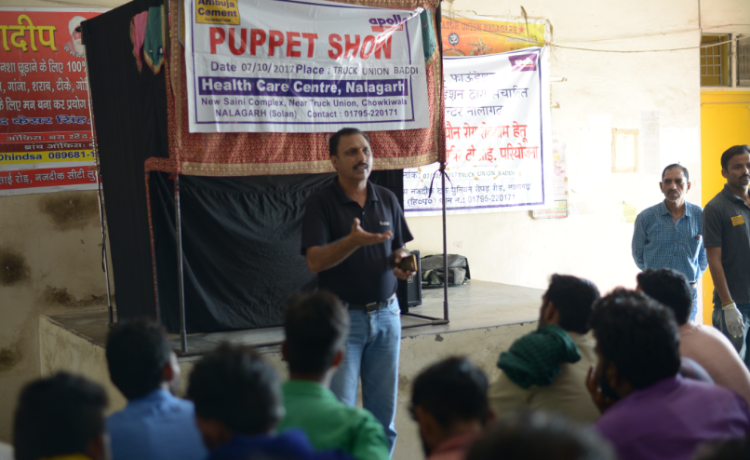Flour millers like Balveer Singh were educated by the Ambuja Foundation team on the dietary benefits of mixed flour and encouraged to not only promote it but also sell it at their mill.
Read more

The women in Mehma Sawai village were having a lot of issues with their health, and also with Primary Health Centre located 4 kms away, lack of transportation, they were bound to neglect health. Diabetes, hypertension, heart diseases and the Punjabi diet was slowly wreaking a havoc.
Read more
As we mark World Earth Day 2025, it’s the perfect moment to spotlight the role of solar energy in transforming rural India—not just environmentally, but socially and economically as well. With climate change looming and traditional resources depleting, clean, alternate and renewable energy isn’t just an ideal—it’s a lifeline. Across villages in India, solar power is reshaping daily life, making communities more resilient, self-reliant, and future-ready.
Read more
Ambuja Foundation in collaboration with AIIMS Bathinda, Association of Breast Surgery, UK (ABS) along with its counterpart Association of Breast Surgeons in India (ABSI) and Punjab Medical Council hosted a Breast Cancer Awareness event in the rural communities of Bathinda, Punjab. Supported by Ambuja Cements, this 3-day event, a health check-up camp was hosted, drawing the participation of 100 women for thorough medical assessments.
Read more
A frail young woman, barely 20, walks into a public health clinic and faints. She had gone there from her village in Farakka, West Bengal, for a prenatal check-up. In Chandrapur, Maharashtra, a teenager is weeping as she talks to the Ambuja Foundation Sakhi. She is distressed that her mother is accusing her of doing something wrong with a boy because her menstruation stopped a few months ago. In a tribal area nearby, 55 people test positive for sickle cell disease. Somewhere in rural India, the women of the house sit down to their meal after all the men have been served, there's no fish left for them. They'll make do with the bones.
Read more
Picture the sun rising over the fields, casting a golden hue as groups of villagers gather for their daily exercise routines. This scene, traditionally uncommon in rural India, is becoming a symbol of change to combat the rising incidence of non-communicable diseases (NCDs). Among these groups in Chandrapur, Maharashtra are Sunita Thamke and her husband Vinod Thamke.
Read more
Executing a number of community welfare activities and creating awareness around nutrition, Ambuja Foundation zealously celebrated Poshan Maah 2024 in the month of September. The Foundation, known for its pan-India social development work to transform rural communities, conducted a month-long nutrition campaign focusing on awareness, health camps, community engagement programs and rallies in collaboration with ICDS and Health Department of the districts. Many events such as ‘god bharai’, ‘Annprashan’, counselling on breastfeeding and family planning were organised, focusing on maternal nutrition and balanced diet in association with ICDS and Health Department at AWCs and Block level. Even at the skill training centres and amongst women and adolescent groups health camps and check-up sessions.
Read more
Ajija Bibi (35) was just 12 years old when she rolled her first bidi (cigarette). She grew up, and today lives in Murshidabad, West Bengal, which has emerged as a prominent centre for the bidi industry in India. Women in every household spend their days rolling bidis and have become so proficient at the task, that they can roll up to 3000 bidis a day!
Read more
To those who once knew it, Mohi Kalan is almost unrecognisable! Once a ‘dumping ground’ for household rubbish, today village streets are squeaky clean and ponds are a thriving oasis for birds and other local animals – a transformation that has earned them not one, but 3 awards for being the ‘Cleanest Village’.
Read more
Whilst the fourth WHO global tobacco trends report highlighted a reduction in global tobacco users, low and middle-income countries remain at the forefront of the problem. Home to around 80% of the 1.3 billion tobacco users worldwide, countries like India are massive markets and opportunities for tobacco companies to recruit new tobacco users.
Read more
Breast cancer is the most common cancer among women globally - also topping the list of cancers among women in India. However in rural India, women barely know about breast cancer, fear examination and have to defend a host of social and cultural taboos - leading to delayed detection, and a higher risk of mortality.
Read more
This year marks a decade since Ambuja Foundation and Apollo Tyres Foundation partnered together to initiate health interventions for truckers in India. Ms. Rinika Grover, Head - Sustainability & CSR at Apollo Tyres Ltd, speaks at length about the power of ‘going together’ when it comes to CSR.
Read more

